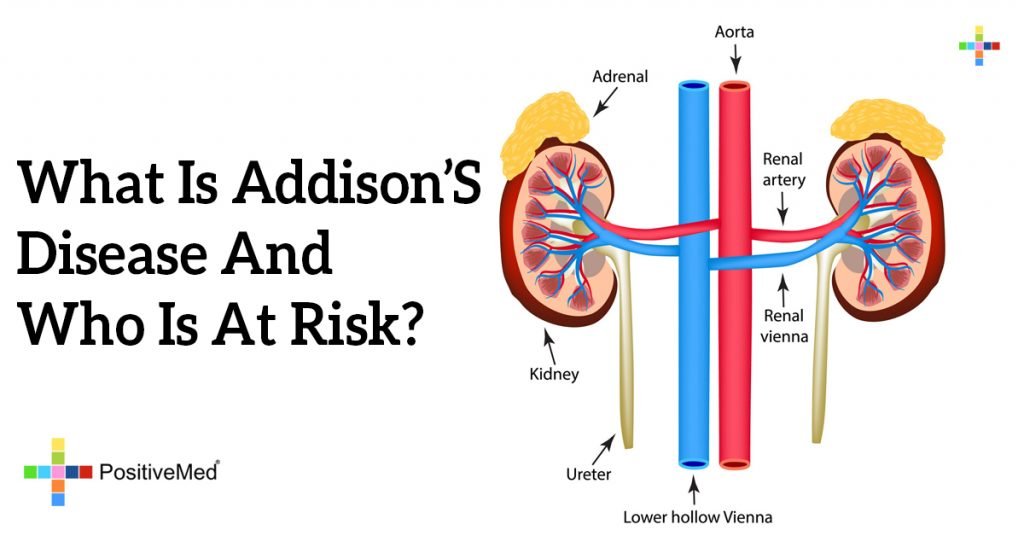
What Is Addison’s Disease and Who Is at Risk?
[nextpage title=”…”]
Addison’s disease affects 200,000 people each year and is a chronic condition that can last a lifetime or for several years. The disease develops when the body doesn’t produce enough hormones from the adrenal glands, including insufficient levels of aldosterone and cortisol. Although there is not yet a cure for the condition, there are several treatment options that are available to manage the disease.

Symptoms
There are a number of symptoms that are associated with Addison’s disease, which includes extreme fatigue, salt cravings, nausea and vomiting, low blood pressure, weight loss with a decreased appetite, body hair loss, depression, and irritability. Many people who suffer from the condition may also experience acute adrenal failure, which includes losing of consciousness, low blood pressure, pain in the lower back or legs, and severe vomiting or diarrhea. This can make it challenging to maintain work performance or daily responsibilities.
Treatment
According to Mayoclinic.com, it’s important to see a doctor if you experience muscle or joint pains, unintentional weight loss, hyperpigmentation on the skin, gastrointestinal issues, and severe fatigue that is accompanied by salt cravings.
Doctors are able to diagnose the disorder after asking questions about your symptoms and your family’s medical history. This may also include undergoing a blood test to determine how much sodium is present in the body and if adrenal insufficiency is the cause. An ACTH stimulation test may also be performed to measure the level of cortisol in the body before and after you receive an injection of synthetic ACTH. This will reveal if the adrenal glands are damaged if the output of cortisol is limited in response to the synthetic ACTH. You may also undergo imaging tests with a CT scan that is taken of your abdomen to determine the size of your adrenal glands, which will also reveal any other abnormalities that may be present. If the tests show that there is secondary adrenal insufficiency, an MRI scan will be performed.
Insulin-induced hypoglycemia tests are occasionally performed, which checks the blood sugar and cortisol levels after an injection of insulin is given by a medical professional.
Causes
Addison’s disease is caused by adrenal glands that become damaged, which are located above the kidneys and produce insufficient amounts of aldosterone and cortisol. They are also known to give directions to every organ and tissue in the body. Other causes of the condition can include Tuberculosis, infections of the adrenal glands, cancer that spreads to the adrenal glands and bleeding that occurs in the adrenal glands.
RELATED ARTICLE: The 13 Main Signs Of Adrenal Fatigue And Its Natural Treatment
[/nextpage] [nextpage title=”…”]
Secondary adrenal insufficiency occurs when the pituitary gland is diseased due to insufficient production of hormones that are normally produced by the adrenal glands. Some people may also develop it when they stop taking corticosteroids for treatment of chronic conditions that they’re suffering from.
Natural Treatments
There are a number of different home remedies for alleviating the symptoms that are associated with Addison’s disease. Ginger is a common treatment option that can alleviate the symptoms and even offer a long-term treatment option by reducing nausea and stimulating bowel movements. According to Organicfacts.net, these are two natural options that can prevent autoimmune attacks from occurring because they’re closely related to supporting a healthy immune system.
Those who suffer from Addison’s disease can also consume citrus foods or natural foods that contain antioxidants to boost the immune system and delay the condition’s progression. Some people may also consider taking astragalus, milk thistle, and echinacea for herbal supplements that also boost the immune system and can complement a specific treatment plan that a medical professional provides.
Consuming turmeric and reishi mushrooms are also known to heal Addison’s disease and delay its progression by strengthening the immune system and increasing hormone production in the body. This helps to counteract the drop in hormone production when the adrenal cortex is attacked by other diseases that are present or by the autoimmune cells.
Although research is still being conducted on Addison’s disease, there are many ways of coping with the condition and alleviating the symptoms for long-term relief. Many of the natural remedies and treatment options that are available will make it easier to reduce discomfort and maintain a normal life again. The natural options that are available will not only make it easier to maintain a routine again but can also cause the disease to subside in the future for permanent relief.
[/nextpage]





